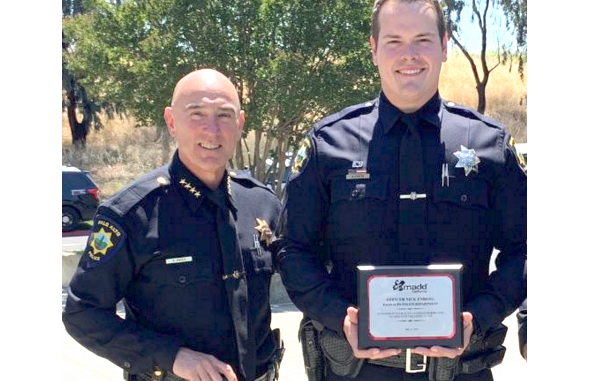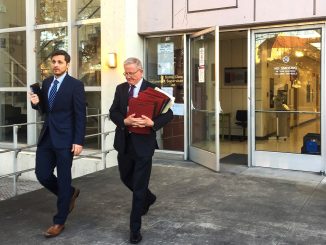
BY KYLE MARTIN
Daily Post Staff Writer
Palo Altans expressed outrage over the attack of a sleeping man by a Palo Alto police dog and they called upon City Council to end the encryption of police radio transmissions.
“You’re still not being transparent. They’re still not being held accountable,” said resident Raven Malone, who ran unsuccessfully for council last fall. “We’ve seen police officers even be promoted after using the ‘n-word.’ I don’t think those are Palo Alto values. I don’t think we should settle for that.”
Council ran out of time during its 90-minute study session last night on the police, but not before Mountain View resident Salim Damerdji told council “it’s absolutely outrageous” what happened to Joel Domingo Alejo.
Alejo is the man who was sleeping in his backyard on June 25 when he was attacked by a police dog being handled by Palo Alto police Agent Nick Enberg. Enberg, who had been asked by Mountain View police to search for a kidnapper, commanded his dog to repeatedly bite Alejo before discovering he was the wrong man. Now Alejo has filed claims against Palo Alto and Mountain View for $20 million. (Alejo’s initial claim against the city of Palo Alto and a later claim.)
“I appreciate the chief’s words when it comes to transparency and accountability, but there was no accountability here for officer Enberg, and there has not been transparency when it came to this case,” Damerdji said. “I suspect that Palo Alto’s police department did not want to be as transparent about what actually occurred in this incident in the middle of calls for police reform last year, and it’s clear that police reform is absolutely needed in PAPD.”
Speakers want cop fired
And resident Eva Tang said she was “horrified” to learn about Alejo’s attack by Enberg, and asked that the city reconsider keeping Enberg on the police roster. Many others are calling for Enberg’s firing including Rev. Jethroe Moore II, president of the San Jose/Silicon Valley branch of the NAACP.
Tang said that Enberg was named as a defendant in the lawsuit from Tajae Murray, a Palo Alto High School student, whose family sued the city for injuries sustained from a 2016 police dog attack. The city paid Murray and his family $250,000 to settle the suit.
And Enberg was named as a defendant in another lawsuit from Julio Arevalo, who sued the city in 2019 after he was violently arrested by Police Agent Thomas DeStefano outside Happy Donuts on July 10, 2019.
She also pointed out that Enberg was one of two officers who shot and killed William Raff on Christmas Day 2015 outside a group home for mental patients at 652 Forest Ave. Raff, who was suffering from a mental health crisis, refused to drop a knife when he confronted the officers.
The District Attorney cleared Enberg of any wrongdoing in the incident.
“At least think about the fact that he’s making you look bad,” Tang said. “Please be more transparent and hold Nick Enberg accountable.”
Police radio encryption
Council members didn’t have a great deal to say about the dog attack, possibly because the city will end up in court over the incident, but they told Police Chief Robert Jonsen they were concerned about his decision in January to encrypt the radio transmissions of the police and fire departments. The decision never went to council for a public hearing or review. Last night was the first public opportunity for council members to question Jonsen about it.
Jonsen said he encrypted the radio transmissions following a memo from the state Department of Justice that advised police departments to keep certain personal information and law enforcement data off the public airwaves.
Councilman Greer Stone and Vice Mayor Pat Burt wanted Jonsen to come up with options that would protect privacy but still allow the public and the press to listen to police activity on the radio.
Stone calls it a First Amendment issue
“I think this is an issue that’s really impeding the First Amendment of the right of the press to do their job in being a check on our government,” Stone said. “And I understand it’s difficult to develop and implement a new policy, but the First Amendment sets a floor that we can’t constitutionally fall below. And we’re not meeting that standard here.”
While Jonsen said police have been searching for alternatives to the encryption, he said he hasn’t found a viable alternative that he believes would work in Palo Alto.
Stone wanted to know why police couldn’t leave an unencrypted police radio channel open for “day-to-day” police communications while using a second encrypted channel exclusively for communicating protected personal information.
But police officials were quick to tell him they can’t do that.
Police Capt. April Wagner told Stone that because of last year’s budget cuts, the department doesn’t have the number of dispatchers necessary to monitor police radio channels.
Last year’s cuts eliminated 11 vacant officer positions, four vacant dispatcher jobs, two lieutenant slots, a technical services director, a public information officer and a communications manager. A total of four people were laid off.
Wagner said other larger departments are able to communicate across multiple channels because they have more dispatchers. But in Palo Alto, Wagner said, there are just three during a shift, and they have to handle 400 calls a day for fire, police and utilities. For Stone’s suggestion to work, the department would have to hire dispatchers to run the encrypted channel during every shift, she said.
Stone said he had more questions for the police chief that he would email later because he ran out of time for questions.
Press can’t talk to officers directly anymore
Burt said he is also concerned about the encryption and a second issue hindering the press — the policy enacted last fall that reporters have to send their questions to police through a web portal rather than directly speaking to an officer. Then the department will respond via email perhaps a few hours later or a few days later. And the opportunity to ask follow-up questions, which would be present during a live interview, is lost with the exchange of emails.
Burt said he wanted the police matter to return to council and, in the meantime, he suggested police find a way to allow reporters to once again ask questions of an actual police officer.
He said he wants police to take “as immediate an action as we can” on a system of reporting police activity to the press.
Burt added he wants the city to contact its lobbyist in Sacramento to see if any of the state’s legislators would be willing to put a bill through that would prohibit encryption.
Deputy City Manager Chantal Gaines told Burt the city could lobby legislators to introduce a bill during the next legislative session starting in December 2021. The deadline to introduce bills this year was Feb. 19.
But Burt pushed for more immediate action, saying he wants the city to find someone who would “gut and amend” so that such legislation could be introduced in the current session, which ends in September. “Gut and amend” is a process by which a bill that was introduced early in the session is gutted of its contents and replaced with a new bill.
Palo Alto resident Rita Vrhel said police were “completely taking away the transparency that has existed in this town for years” by encrypting police radios.
“Personally I don’t want to defund the police, but I do want to hold them accountable,” Vrhel said. “And when something like this encryption happens overnight without public knowledge, it really does make ordinary citizens like me wonder ‘Who is in charge of Palo Alto?’”
‘Cowboy activity’
Vrhel added that council “needs to do whatever they can to reign in this kind of cowboy activity, which really does not serve us well.”
Similarly, resident Kevin Ma told council the encryption was done “too hastily.”
Mayor Tom DuBois said he wants encryption to be reversed immediately.
On March 8, Jonsen wrote to the Department of Justice’s chief of information services to ask permission to lift encryption through the end of the year so that the city could research alternatives to encryption. But Jonsen said that as of yesterday, he still hasn’t received a response.
DuBois said he would rather the city reverse the encryption immediately for the rest of the year without asking permission of the DOJ and find a new solution to encryption in the meantime.
Drones
In regard to the dog attack, Jonsen suggested drones might help police search for people.
Mayor DuBois responded that Palo Alto residents wouldn’t want the police to use drones.
But Councilman Greg Tanaka said other cities have been “very successful” with them.




I have a hard time believing Enberg didn’t face some kind of formal discipline within the department. If a police chief were serious about keeping his department clean, you’d think there would be some sort of review system with maybe an internal trial board. But there’s been absolutely no mention of that. It’s like it never happened. Even if the chief felt he couldn’t talk about the Enberg case in particular, there’s no reason last night why he couldn’t have explained what would normally happen in such a case. He didn’t, which leads me to believe that Enberg got off with an attaboy after his dog mauled Mr. Alejo. I sure hope I’m wrong, but that’s the culture I’m seeing out of the Police Department these days. When something goes wrong, sweep it under the rug and don’t tell anyone, especially the people whose taxes pay all of these out of court settlements.
Police should suspend the use of police dogs to look for suspects until another more humane way is found. I’m not proud of my Police Department when they allow their dogs to attack people, as if this were Nazi Germany.
I think it is very easy and cheap to throw out judgements before you know all the facts that led up to the event and using charged language like “Nazi” is over the top. Calm it down and let the matter be investigated properly using facts. Day in and day out the police do a fine job in often dangerous situations and they deserve to be treated just any of us would, innocent until proven guilty. How fast would some people change their tune if they were at the bad end of an abduction??
Thank you John. 100%.
John, exactly what facts do you still need?
1. Alejo was not the kidnapper police were seeking. Police acknowledged publicly that he was the wrong man.
2. The video shows Alejo didn’t resist or fight the officer.
3. Alejo didn’t have a gun or any other weapon that could have hurt the officer.
What additional facts do you need to know?
In arguments like this, the guy who says “I need more facts” or “I’ll wait for more facts,” just wants the case to go away because he’s on the wrong side.
“Let the matter be investigated …”
This happened June 25, 2019 and it’s now April 9, 2020. It’s been 41 weeks since this happened. Isn’t that enough time to “let the matter be investigated”?
How much longer should we give the police?
[Comment deleted — Don’t accuse people of committing crimes unless they’ve been charged with those crimes, and don’t make up facts.]
[Comment deleted — Don’t accuse people of committing crimes unless they’ve been charged with those crimes, and don’t make up facts.]
Regarding the discipline or termination of Agent Enberg, we don’t have much information so I would avoid jumping to conclusions. All we know is that Enberg is still on the force. As Susan pointed out above, more than 42 weeks have elapsed since the incident, so it is reasonable to assume that if any discipline was meted out, it’s happened already and he’s still on the force. We should get more of a clue about what happened when the police auditor report is released. But those reports have often been delayed by years and key incidents have been omitted, such as the Zach Perron n-word case. When it comes to revealing what discipline took place, the city has to balance the privacy rights of an employee (we all enjoy those rights) and the public’s right to know what their government is doing.